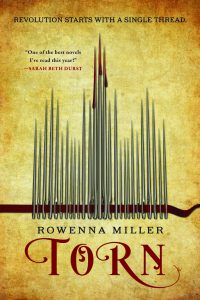
Torn by Rowenna Miller (The Unraveled Kingdom #1)
Genre: Fantasy, Historical Fantasy
Publisher: Orbit on March 20, 2018
Source: Publisher
![]()
![]()
![]()
My thanks to the publisher for providing me with a digital review copy. No compensation was provided for this review, and all opinions are my own.
Torn is the first book in an enchanting debut fantasy series featuring a seamstress who stitches magic into clothing, and the mounting political uprising that forces her to choose between her family and her ambitions. View Spoiler »
![]()
![]()
![]()
Sophie Balstrade is an accomplished seamstress, shop owner, and charm caster. She creates beautiful garments for the nobility…many of which are sewn with good luck charms. But when her brother Kristos becomes embroiled with the Labourers League, a revolutionary group advocating democratic governance, Sophie must decide where her true loyalties lie: with her clientele, her brother, or her country.
There’s a lot of really strong world building in TORN, ranging from the political and social lives of those living in Galitha City to the magic system. Sophie’s ability to cast charms is stronger than the average caster’s, which she attributes to the rigorous training she received at her mother’s knee. Charms are not well-respected by most Galithian people; by combining her charms with haute couture, Sophie disassociates her wares from the “backwater” nation Pellia thus making them fashionable for the Galithian nobility. Unsurprisingly, there’s a lot going on under the surface in TORN: classism, racism, and sexism all figure prominently in the story.
Sophie’s dedication to her craft is admirable, and I was impressed with her tenacity in starting and keeping her business afloat. One of the things I like best about the politics in TORN is the acknowledgement that labourers may all belong to one oppressed class, but working women face very distinct threats from their male counterparts. If Sophie were to marry, she would have to relinquish control over her business and its income. In terms of her business life, Sophie really makes things happen. Unfortunately, the same cannot be said for pretty much every other quarter of her life.
My major gripe with TORN is Sophie’s passive nature: the revolution happens around her and she’s backed into a corner by its proponents. She’s primarily a reactive character, which is especially clear in the central conflict in the story, as she’s faced with the decision whether to support the Labourers League or the nobility. Both sides have good arguments, although it quickly becomes plain that a revolution of some sort is inevitable. I think most people will relate to Sophie’s conundrum, and they’ll find her sympathetic — up to a point. A character can only be “torn” for so long before the reader (or this reader, at least) starts to become impatient with their lack of decisiveness. Particularly when it lasts two thirds of the book!
Thankfully in the final third of the book circumstances force Sophie into high gear, and she starts to wrest back control of her life. She learns a lot about her magical abilities, which was really cool to read about, and has the epiphany that her power can be used for more than just beautiful clothes (duh). I just wish all this action had happened earlier in the story. Personally, I rejoiced when Sophie finally confronted the men seeking to manipulate and control her. Y’all already know that there’s nothing I love more than seeing traditional “women’s work” weaponized against villainous, sexist male characters!
And these guys really seem to abound in TORN, ranging from the truly despicable to the casually sexist. Unfortunately, that’s a pretty realistic representation of what it means to be an ambitious woman: there’s always some random guy trying to bring you down. Even Theodor, the Duke that Sophie falls in love with, is problematic in his own way. Thankfully there are some awesome women in the cast of secondary characters to make up for it: the women who work in Sophie’s shop and the noble women she meets as her shop’s profile rises are equally interesting.
Rowenna Miller’s TORN is an ambitious debut, and while it didn’t always work for me, the final chapters have certainly convinced me to return for the second book.